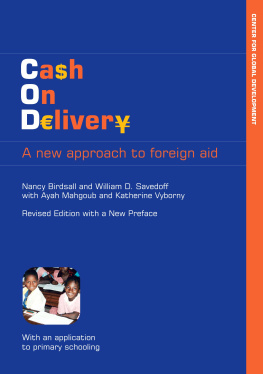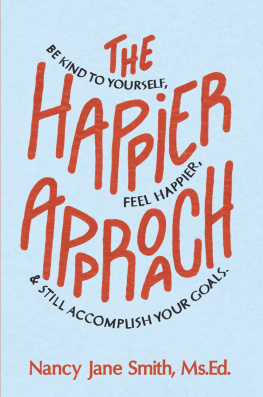Copyright 2010, 2011
First edition 2010. Second edition 2011
CENTER FOR GLOBAL DEVELOPMENT
1800 Massachusetts Avenue, N.W.
Washington, D.C. 20036
www.cgdev.org
All rights reserved. No part of this publication may be reproduced or transmitted in any form or by any means without permission in writing from the Center for Global Development.
The views expressed in this volume are those of the authors and should not be attributed to the board of directors or funders of the Center for Global Development.
Library of Congress Cataloging-in-Publication Data
Birdsall, Nancy.
Cash on delivery : a new approach to foreign aid / Nancy Birdsall and William D. Savedoff ; with Ayah Mahgoub and Katherine Vyborny. -- 2nd ed.
p. cm.
With an application to primary schooling.
Includes bibliographical references and index.
ISBN 978-1-933286-60-0 -- ISBN 978-1-933286-61-7 1. Economic assistance--Developing countries. 2. Developing countries--Economic policy. I. Savedoff, William D. II. Mahgoub, Ayah. III. Vyborny, Katherine. IV. Title.
HC60.B523 2010
338.91091724--dc22
2010052625
ISBN 978-1-933286-60-0
eISBN 978-1-933286-61-7
Cover photo by Harvey Nelson/Courtesy of Photoshare.
Editing and typesetting by Communications Development Incorporated, Washington, D.C.
E-book composition by John Osterman
Preface to the second edition
Since Cash on Delivery was published in March 2010, the ideas we proposed have been embraced by presidents and ministers, by heads of public and private institutions, and by researchers and practitioners. The Education Ministry in Malawi sent us a letter asking for help creating a COD Aid program there, the British government has publicly committed to financing pilot experiences, and articles and essays have addressed COD Aid in a range of publications including The Economist, The New York Times, and Public Choice. In the debates that have ensued, we have learned even more about the Cash on Delivery Aid (COD Aid) approach and how significant a departure it could be from current aid practices.
One of the first things we learned is just what sets COD Aid apart from other results-based aid programs. While most results-based approaches focus on structuring incentives to change behavior in developing countries, COD Aid aims at changing the behavior of both funders and recipients. Results-based approaches that pay service providers for improving performance, individuals for changing behaviors, or local governments for delivering particular services, have their merits and should continue to be explored; however, they are not geared to address constraints to development at the national level or to give recipient countries full flexibility to try interventions or address policy issues outside the domain of the relevant sector ministry. They are also not meant to make the recipient government primarily accountable to its own citizens rather than to the outside donor. COD Aid does all of these things by transferring full ownership and responsibility over strategies to the recipient country.
Feedback on the book has also helped us clarify how COD Aid could transform the risks facing developing countries when they receive aid. Currently, aid-dependent countries are vulnerable to changing priorities and domestic politics in funding countries and face considerable uncertainty over how much aid they will receive in any given year. By contrast, COD Aid legally binds funders to pay a fixed amount for each verified unit of progress. A clear enforceable contract with independent verification, as proposed in this book, means that the recipient country only assumes risks related to delivering outcomes. These risks are closely related to the countrys own efforts and are more responsive to its own actionsif not in any given year then certainly over the five or more years we recommend for a COD Aid contract.
Discussions about preconditions for successful COD Aid agreements strengthened our conviction that the only true preconditions for this new approach are a good measure of progress and a credible way to verify it. We have heard a number of proposals for such preconditions, but none seem particularly compelling. Requiring that recipients submit plans as a precondition would undermine the hands-off nature of the COD Aid agreement. It would perpetuate assumptions (despite substantial evidence to the contrary) that joint planning can substitute for country ownership and that donor-sponsored planning, rather than country-driven experimenting, is the key to progress. Similarly, conditioning a contract on adequate financial controls assumes that it is better to control the use of funds by tracking where they go than to control the use of funds by verifying what they yield. Finally, waiting until countries have information systems in place is a recipe for delay when alternative approaches to measuring progress are available. In short, the key features of COD Aiddefining the outcome indicator, the amount of the payment, the means of verification, and requirements for transparencyare the only real preconditions for COD Aid. Any further eligibility conditions are likely to undermine the restructuring of the accountability relationships or to simply delay implementation.
The limited number of preconditions for COD Aid may make it ideal for so-called fragile states, countries like Liberia after emerging from civil war or like Malawi after deposing its long-lived dictator. In some of these countries, strong positive leadership emerges, but in a context of weak public institutions. Budget support mechanisms cannot be applied fully because recognizable public expenditure frameworks are lacking, and traditional aid projects bypass rather than strengthen public institutions. In such places, COD Aid might be ideal because it effectively controls the use of funds by verifying the progress it achieves rather than the inputs it buys. By working through the government, COD Aid arrangements strengthen public institutions and motivate politicians (and not just technocrats) to care about measuring the countrys progress against clear goals. In these ways, they could help generate the very change that we call development.
Finally, we came to see that the amount that funders should offer to pay for each increment of progress is not necessarily linked to the input costs of achieving those gains, which are in any event difficult to assess ex ante in any particular country or setting. In principle, the amount should instead be based on how much funders value those outcomes. At the same time, funders justifiably want to get as much value as possible for limited aid budgets, and they will also want to avoid overpaying relative to the true costs. If the COD aid payments are comparable with the cost of progress through conventional aid, then they represent good value for money. To the extent they supplement conventional aidproviding an additional incentive for countries to use existing resources more efficiently or triggering helpful changes in political and bureaucratic arrangementsCOD Aid payments can be lower than conventional aid that finances inputs at cost. Of course, ultimately no one knows how much it costs to alter institutions, reconfigure political bargains, or expand capacity in each service in each country. Such knowledge takes time and insight about local politics and institutions that is possible when funders focus less on inputs and more on outcomes, as envisioned in COD Aid.
In essence, we are not arguing that COD Aid is worth trying because it creates a better incentive for recipient countries. We are arguing that it is worth trying because it creates a better relationship between funders and recipients. It would focus attention on the jointly desired outcome, on getting precise and reliable information about that outcome, and on directing funds in proportion to progress. Any variability in payments would result not from political and bureaucratic processes in the funding institutions, but from factors related to achieving progress that are more in the purview of the developing country. COD Aid would change the structure of information reporting and payment triggers for both funders and recipients. Ultimately, it would invite the kind of institution building at the state level that is key to sustainable service delivery and to development itself.








